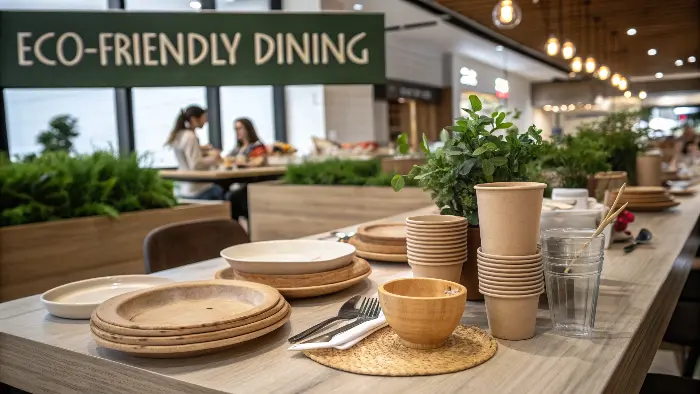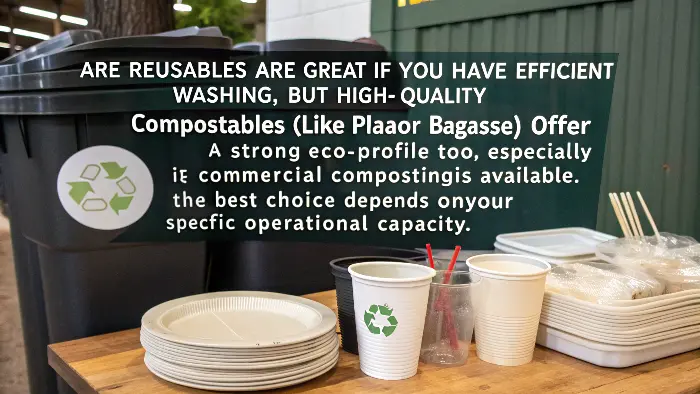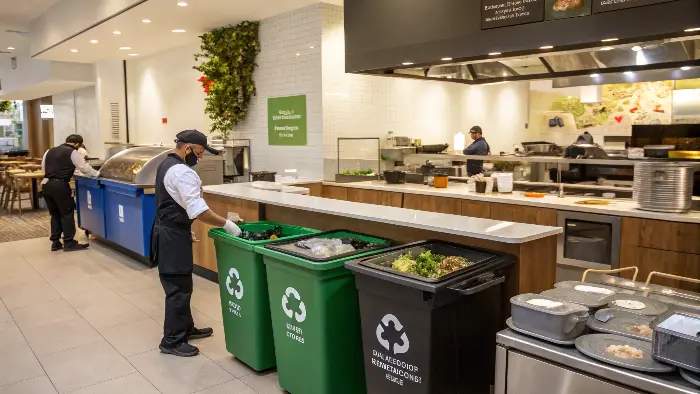Worried about hidden risks in your tableware? Concerned about customer health? Switching to eco-friendly options can significantly cut these liabilities and boost diner confidence.
Restaurants can reduce health liability by choosing eco-friendly tableware made from non-toxic materials like PLA or bagasse. This minimizes guest exposure to harmful chemicals often found in conventional plastics, directly enhancing food safety.
So, you’re running a restaurant, and things are hectic, right? Between the kitchen, staff, and customers, the last thing you need is a lawsuit or a health scare traced back to your serving dishes. I get it. That’s why this whole topic of eco-friendly tableware isn’t just a "nice-to-do" for green PR; it’s actually a smart move for your bottom line and your peace of mind. Let’s dig into how this simple switch can be a game-changer.
How Can Eco-Friendly Tableware Directly Lower Health Risks for Diners?
Are your plastic plates a hidden danger? Concerned about chemical leaching? Eco-tableware offers a safer, non-toxic alternative, protecting your customers’ health effectively.
Eco-friendly tableware, often made from natural materials like sugarcane bagasse or PLA, avoids harmful chemicals like BPA or phthalates found in some plastics. This directly reduces the risk of these substances leaching into food.
Okay, let’s get straight to the point here because this is super important. The materials your food touches matter. I’ve spent years at Ecosourcecn looking into this, and what we’ve found is that conventional plastic tableware can sometimes be a bit of a minefield. You know, those cheap plastic plates or containers? They might contain things like BPA, phthalates, or other not-so-great chemicals. And when hot food, or oily food, or acidic food sits in them, well, those chemicals can sometimes decide to take a little trip into the food. Yikes! I remember talking to a nutritionist friend, and she was adamant about this – she said, "Think about it, we tell people to eat clean, organic food, and then it gets served on questionable plastic?" That really stuck with me.
So, how does eco-friendly tableware help?
The Problem with Some Conventional Plastics:
- BPA (Bisphenol A): This one’s a well-known troublemaker. It’s an endocrine disruptor, meaning it can mess with hormones. It’s been linked to a bunch of health issues. While many products are now "BPA-free," it’s still something to watch out for, and sometimes its replacements (like BPS) aren’t much better.
- Phthalates: These are used to make plastics more flexible and durable. But, like BPA, they can leach into food and are also linked to hormone disruption and other health concerns.
- Styrene (in Polystyrene/Styrofoam): Often found in foam containers, styrene is a suspected carcinogen. Heating food in these containers is a big no-no. Honestly, seeing food in styrofoam just makes me cringe now.
The Eco-Friendly Advantage:
Now, compare that to options like those we champion at Ecosourcecn:
- Bagasse (Sugarcane Pulp): This stuff is amazing. It’s a byproduct of sugarcane processing, totally natural. It’s sturdy, can handle hot and cold, and best of all, no nasty chemicals to worry about. It’s just plant fiber.
- PLA (Polylactic Acid): Made from cornstarch or sugarcane, PLA is a bioplastic. It’s food-safe for its intended uses (usually cold items, though some new PLAs have higher heat resistance). It’s a fantastic alternative to petroleum-based plastics. When Jacky, our eco-conscious packaging specialist friend from Canada, looks for compostable options, PLA is high on his list because it meets strict standards.
- Bamboo/Palm Leaf: These are other natural materials that are inherently safer. They bring a cool aesthetic too!
By making the switch, you’re actively reducing the chances of your diners ingesting these potentially harmful substances. It’s a direct step towards what my Chinese colleagues often emphasize: "最大限度地减少接触潜在有害化学物质和材料" – minimizing exposure to potentially harmful chemicals and materials. This isn’t just about perceived safety; it’s about actual safety. And that’s a powerful way to protect both your customers and your restaurant’s reputation. It’s a simple change with a big impact on health liability.What are the Broader Business Benefits for Restaurants Adopting Sustainable Tableware?
Thinking sustainability is just a cost? Worried it won’t pay off? Adopting eco-tableware enhances brand image, attracts new customers, and can even improve staff morale.
Beyond health, sustainable tableware boosts your brand’s eco-credentials, appeals to a growing market of conscious consumers, and can differentiate you from competitors. This often translates to increased loyalty and positive reviews.

So, we’ve established that eco-friendly tableware is a win for health safety. But let’s be honest, as a restaurant owner, you’re also thinking about the business side of things, right? Will this cost more? Will customers even notice? Well, I’m here to tell you that the benefits go way beyond just dodging health bullets. In fact, embracing sustainability can be a real power-up for your brand. I’ve seen it happen time and time again with clients we work with at Ecosourcecn. One small cafe owner I know switched to our compostable coffee cups and bagasse pastry boxes. She told me, "I thought it was just a small change, but people noticed. They started conversations, took pictures for their Instagram! It was amazing."
Key Business Advantages:
- Enhanced Brand Image and Reputation:
- Today’s customers, especially millennials and Gen Z, care deeply about where they spend their money. They actively seek out businesses that align with their values. As my insights note, "这一转变也符合顾客对可持续食品的偏好,有助于提升品牌形象." A visible commitment to sustainability, like using eco-friendly tableware, instantly elevates your brand. It says you’re responsible, you’re forward-thinking, and you care. This is huge for building trust.
- Attracting New Customers (and Keeping Them!):
- People like Jacky, who are passionate about eco-friendly choices in their personal and professional lives, actively look for businesses that share these values. Switching to sustainable tableware can be a magnet for this growing demographic. And once they find you? They’re more likely to become loyal patrons and spread the word. It’s like creating your own tribe of eco-conscious foodies! 🔥
- Differentiation in a Crowded Market:
- Let’s face it, the restaurant scene can be competitive. What makes you stand out? Your unique menu, great service, and… your commitment to the planet! Using visibly eco-friendly products like our PLA cutlery or bagasse plates can be a talking point and a clear differentiator. It’s a story you can tell.
- Potential for Positive PR and Marketing:
- Made a switch to 100% compostable takeout containers? That’s news! Share it on social media, put a little note on your menu, tell your local paper. People love good news stories, especially when it comes to businesses doing their part for the environment. It’s authentic marketing content.
- Improved Staff Morale and Attraction:
- Believe it or not, your employees care too. Working for a company that’s trying to do good can be a source of pride. It can make your restaurant a more attractive place to work, which is a big deal in the hospitality industry. I’ve heard staff say they feel better serving food in something they know is better for the planet.
It’s not just about cost; it’s about value. And the value proposition of sustainable tableware goes far beyond the material itself. It’s an investment in your brand, your customer relationships, and your place in the community. It’s about aligning your operations with a more sustainable future – and that, my friends, is good business.Are Reusable Options Always the Best Eco-Choice Over Single-Use Compostables?
Torn between reusables and disposables? Worried about greenwashing? We compare the true eco-impacts, helping you choose the genuinely greener path for your setup.
- Believe it or not, your employees care too. Working for a company that’s trying to do good can be a source of pride. It can make your restaurant a more attractive place to work, which is a big deal in the hospitality industry. I’ve heard staff say they feel better serving food in something they know is better for the planet.
Reusables are great if you have efficient washing, but high-quality compostables (like PLA or bagasse) offer a strong eco-profile too, especially if commercial composting is available. The best choice depends on your specific operational capacity.

This is a question I get asked a lot, especially by conscientious folks like Jacky who really want to do the right thing. Are reusable plates, cups, and cutlery always the hands-down winner against single-use compostable options like the ones Ecosourcecn specializes in? The answer, like many things in sustainability, is… it depends! It’s not quite black and white. I think we sometimes fall into the trap of thinking "reusable = always perfect" and "disposable = always bad," but the reality is more nuanced.
The Case for Reusables (e.g., Ceramic, Glass, Metal):
- Reduced Waste (Potentially): The most obvious benefit. If used many, many times, a reusable plate prevents hundreds of single-use items from being made and discarded. That’s a big win for resource conservation.
- Perceived Quality: For dine-in experiences, many customers associate reusable tableware with a higher quality feel.
- Lower Per-Use Cost (Long-Term): After the initial investment, the cost per use can be very low, just factoring in washing.
The "Buts" for Reusables:
- Water and Energy Consumption: Washing requires significant amounts of hot water and energy for dishwashers. The detergents used also have an environmental footprint. If your washing process isn’t efficient, or if you’re in a water-scarce area, this can be a major drawback.
- Breakage and Replacement: Ceramic and glass break. This means more manufacturing to replace them, and the broken pieces often end up in landfill.
- Labor Costs: Someone has to collect, scrape, wash, dry, and restock them.
The Case for High-Quality Single-Use Compostables (e.g., PLA, Bagasse):
- Convenience and Hygiene: Especially for takeout, events, or fast-casual settings, compostables offer undeniable convenience. Each use is fresh and hygienic.
- Lower Upfront Investment: No need for expensive dishwashing equipment.
- Reduced Water/Energy in Use Phase: The restaurant itself isn’t using water/energy to wash them.
- Made from Renewable Resources: Unlike conventional plastic, PLA and bagasse come from plants. Our mission at Ecosourcecn is to empower businesses with these sustainable alternatives.
- Compostability (The Big One!): If properly composted in a commercial facility, these items break down into soil conditioner, returning nutrients to the earth. This is a core part of their "eco" promise.
The "Buts" for Compostables:
- Relies on Composting Infrastructure: This is crucial. If they end up in landfill, they don’t break down as intended and can even produce methane. So, access to commercial composting is key. Jacky often has to research this for his Canadian locations.
- Consumer Confusion: Sometimes people don’t know if something is compostable or recyclable, leading to contamination of waste streams. Clear labeling helps!
So, what’s the verdict? For a sit-down restaurant with an efficient, modern dishwasher and a commitment to minimizing water use, reusables can be fantastic. But for a busy takeout joint, a food truck, or an event caterer, high-quality, certified compostable tableware (like our BPI-certified PLA or bagasse products) can be a more practical and often equally eco-friendly choice, especially if you and your customers have access to commercial composting. It’s about choosing the best tool for the job and being honest about the full lifecycle. Sometimes, the "perfect" solution isn’t feasible, but a "much better" solution is right there.Why is the Push for Overall Sustainability in Restaurants Becoming So Crucial Now?
Feeling the pressure to go green? Wondering if it’s just a trend? Sustainability is now a core expectation, vital for relevance, resilience, and responsible business.
Consumer demand for eco-friendly practices, growing regulatory focus on waste, and the urgent need to address environmental challenges make sustainability non-negotiable for restaurants wanting to thrive long-term.

You might be thinking, "Okay, I get the tableware thing, but why this massive push for overall sustainability in restaurants all of a sudden? Is it just a fad?" And honestly, I can see why it might feel like that sometimes. But from where I stand, working with businesses globally at Ecosourcecn, it’s crystal clear: this isn’t just a passing trend. It’s a fundamental shift in how we expect businesses to operate. And for restaurants, it’s becoming mission-critical. It’s not just about looking good; it’s about being good, and that’s becoming essential for survival and success.
Drivers Behind the Sustainability Imperative:
- Skyrocketing Consumer Demand:
- Your customers, especially the younger generations, are more informed and passionate about environmental issues than ever before. They’re not just buying food; they’re buying into your values. They actively seek out and support businesses that demonstrate genuine commitment to sustainability – from ingredients to packaging. I was at a food expo last year, and the buzz around sustainable sourcing and packaging was undeniable. It’s what people are asking for.
- Regulatory Pressure is Mounting:
- Governments worldwide are waking up to the waste crisis, particularly around single-use plastics. We’re seeing more bans on certain items, extended producer responsibility (EPR) schemes, and mandates for recycled content. Getting ahead of these regulations by proactively adopting sustainable practices, like switching to compostable tableware or reducing food waste, is just smart business. It means you’re prepared, not scrambling.
- The Stark Reality of Environmental Challenges:
- Climate change, plastic pollution, resource depletion – these aren’t abstract concepts anymore. They’re impacting our daily lives and the future of the planet. Restaurants, as significant consumers of resources and producers of waste, have a role to play. Embracing sustainability is a way to be part of the solution, not the problem. This really resonates with our mission at Ecosourcecn: "Sustainable Solutions, Global Impact."
- Attracting and Retaining Talent:
- People want to work for companies they believe in. A strong sustainability ethos can make your restaurant a more attractive workplace, helping you draw in passionate employees who are proud to be part of your team. This can make a real difference in a competitive labor market.
- Building Business Resilience:
- Relying on finite resources or practices that are environmentally damaging is, frankly, a risky long-term strategy. Shifting to renewable materials, reducing waste, and conserving energy can actually make your business more resilient to price shocks and supply chain disruptions. Think of it as future-proofing.
For us at Ecosourcecn, helping businesses like yours navigate this shift is what we do. Whether it’s providing PLA utensils, bagasse containers, or FSC-certified paper items, we aim to make the transition to a greener future practical and scalable. It’s not just about selling products; it’s about supporting a movement. And believe me, this movement is only getting stronger. Restaurants that ignore it risk getting left behind. It’s time to lean in!Conclusion
Switching to eco-tableware cuts health risks, boosts your brand, and meets vital sustainability demands. It’s a smart, responsible choice for any modern restaurant.
- Relying on finite resources or practices that are environmentally damaging is, frankly, a risky long-term strategy. Shifting to renewable materials, reducing waste, and conserving energy can actually make your business more resilient to price shocks and supply chain disruptions. Think of it as future-proofing.


